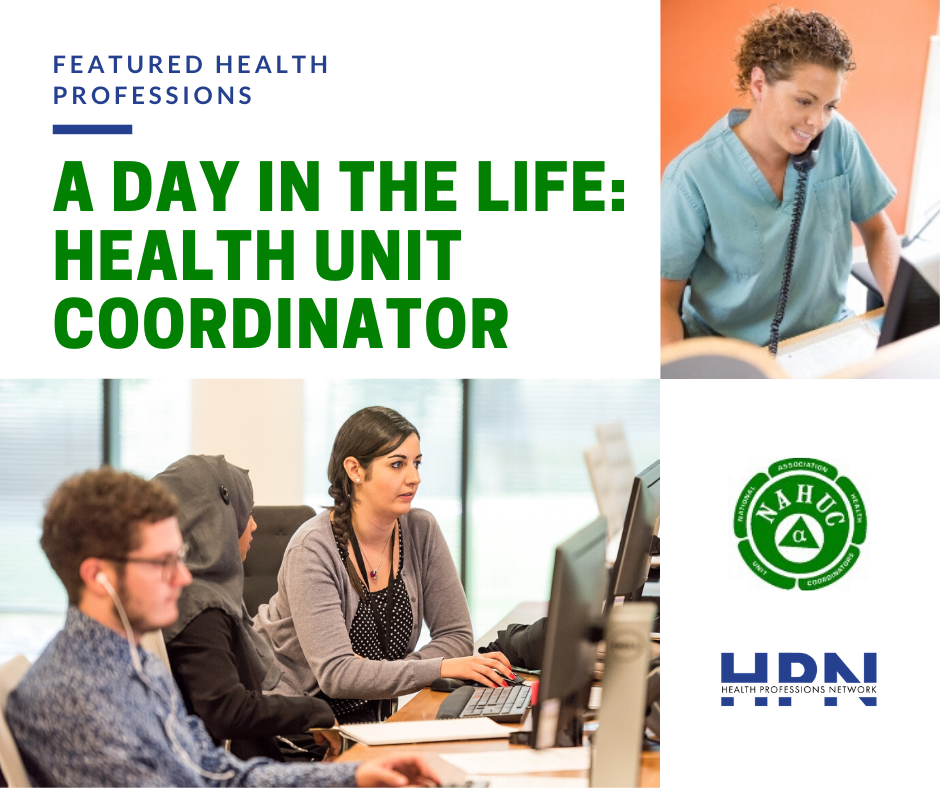This blog is the third in a series of profiles of different clinical health professions represented by Health Professions Network member organizations. These profiles are intended to give students and those looking at prospective careers in health care an accurate, professional perspective on different health care fields, specialties and careers. "A Day in the Life of a Health Unit Coordinator" was developed by the National Association of Health Unit Coordinators, Inc., an HPN member organization.
Table of Contents
- What is a Health Unit Coordinator?
- Goals and Rewards of Being a Health Unit Coordinator
- Becoming a Health Unit Coordinator
- Salary & Professional Outlook for Health Unit Coordinators

What is a Health Unit Coordinator?
When a patient is admitted to a healthcare facility, they and their families know they will have nursing staff and physicians providing care during their stay. What they usually do not realize is that there is another member of this team who takes part in their care behind the scenes: the Health Unit Coordinator (H.U.C.).
A definition of the word “coordinate” that is applicable to the health unit coordinator profession is “to harmonize in a common action, to work together harmoniously: a patient care staff that functions smoothly.” Therefore, it follows that a health unit coordinator is one who facilitates the activities of people engaged in a common action to work together smoothly. A health unit coordinator is one who facilities the activities of people in a health unit to work together to deliver quality healthcare to patients.
The Health Unit Coordinating profession evolved during World War II as a result of the shortage of nurses and physicians on the home front, in order to assume the "non-clinical" duties involved with patient care, such as assembling charts and answering phones. The first recorded documentation of this position, titled "floor secretary" appeared in a medical journal in Pennsylvania in the 1940's, and stated that initially the position was viewed with skepticism, but was soon was embraced wholeheartedly. Over the years, the name has gone through many changes ranging from ward secretary, ward clerk, unit secretary and unit clerk to the present title of Health Unit Coordinator, which more aptly describes what this position does: coordinate the non-clinical aspects of patient care.
Job Description & Responsibilities
The job of a professional health unit coordinator is interesting, self-fulfilling, and wide in scope. The health unit coordinator acts as the communications liaison between all the various departments in the health care facility, including nurses, physicians, other professional staff, ancillary staff, patients, and visitors. Communication between physicians and nurses and various departments and patients and visitors at times needs coordination. The health unit coordinator provides the coordination of that communication. An H.U.C. maintains patient and unit records, orders supplies and services, and manages the physician’s orders. In short, they are a vital force in facilitating the team effort required in a health care unit.
The Health Unit Coordinator today has many duties associated with the delivery of quality health care. Even before the patient arrives, the H.U.C. is hard at work facilitating that the patient’s room is ready, supplies are available, and assembling the necessary documentation for the record of the patient’s stay, either electronically or hard chart.
The H.U.C. is the person who is often the first person one encounters when walking onto a nursing unit in a hospital. They are expected to have all the answers, know where everyone is at all times, and to anticipate the needs of staff and patients. booking procedures and transport, ordering supplies and equipment, setting up services after discharge, making sure pre-operative testing is done and results are available, and maintaining confidential medical records are all aspects of the H.U.C. role.
The H.U.C. expertly utilizes many communication devices including computers, telephones, scanners, intercoms, and fax machines. The H.U.C knows the unit’s inventory and orders supplies from purchasing, print shop, pharmacy, dietetics, linen, and laboratory departments.
As healthcare adapts to new technology, so does the job of H.U.C. Now when a provider enters a patient’s order into the electronic medical record, it goes directly to the appropriate department. Formerly, the H.U.C. transcribed the order. Now the process is more appropriately termed order management, and the H.U.C. ensures the order actually “happens”. We see H.U.C.’s more involved in customer service, also tracking numerous safety concerns and quality control initiatives. Plus, not everything is automated. Maybe a patient is ordered to fast before a procedure, or other preparation is required, or a specimen needs to be collected. The H.U.C. makes sure the meal is held, or that nurses have supplies they need.
A health unit coordinator handles the day-to-day administrative duties of a single section of a medical office, hospital, or clinic. They are highly organized people who aid in customer service, management of physician orders, and coordination of the health unit. The health unit coordinator is at the center of the activity of the workstation. Typically, there is an H.U.C. in every patient care area of the hospital. While the majority work in acute care hospitals, health unit coordinators work anywhere patient care is delivered: outpatient facilities, physician offices, extended care facilities, rehabilitation facilities, etc.
Patricia Rice, CHUC and Association Manager for the National Association of Health Unit Coordinators (NAHUC), stated, “The health unit coordinator is an important member of the health care team and plays an important part in the day to day functions of any patient care unit or department. As the hub on a wheel, the abilities of the HUC can help the wheel of the department spin more effectively, which results in better patient care."

Goals and Rewards of HUCs
- Patient interaction / patient support
Health unit coordinators perform non-clinical duties. Non-clinical duties are those activities that do not involve direct patient care. It is care given without having direct physical or hands-on contact with patients. For example, the health unit coordinator provides indirect patient care by relieving the nurse of clerical duties, managing the physician’s orders, by maintaining patient and unit records, by answering visitor questions, by ordering tests and treatments, and by making sure supplies are available. When these indirect duties are performed well, the care received by the patient is better. - Contribution to quality / health system
Providing exceptional customer service is the main way the health unit coordinator impacts the patient experience. Although the health unit coordinator may never physically touch the patient, the duties they perform contributes significantly to the patient’s care. The H.U.C. has excellent people skills and is proficient in dealing with grieving families, de-escalating tense situations, explaining policies and procedures, adhering to patient satisfaction initiatives, and advocating for families and visitors. - Personal & professional goals and expectations / testimonials
The health unit coordinator functions as a liaison and the job entails dedication to organized, efficient delivery of care, while facilitating a flow of communication and information. “Everybody comes to you,” says Juliann Olsen, H.U.C. supervisor at Primary Children’s Hospital in Salt Lake City, Utah. If you’re a people person, can exhibit patience, articulate yourself well, and meet and greet with a smile, you’ll put those traits to good use as an H.U.C. Juliann says “Know how to listen and prioritize, because so many people will ask you questions. You don’t always get people at their very best, and maybe they’re upset or irate. You need to show empathy for all of them.”

Becoming a Health Unit Coordinator
Academic requirements
Unlike other jobs in healthcare, health unit coordinating requires a manageable investment in education and training. H.U.C. education ranges from on-the-job training to associate degrees. Most common are certificate programs at community colleges and technical or vocational schools, either in the classroom or online.
Clinical requirements
Certification by the NAHUC Certification Board provides proof to your employer, other health care professionals, the public, and your peers that you have demonstrated the basic knowledge and skills. The Certification exam is designed to be a nationally administered, comprehensive job-related objective test. It measures knowledge and skills in areas of job performance considered essential for health unit coordinators under the categories of: Coordination of the Health Unit, Equipment and Technical Procedures, and Communication/Customer Service, and Order Management, and Professional Development. Once certification is successfully obtained, 36 hours of continuing education every three years is required to keep the certified status. Certification demonstrates a commitment to an ongoing process of keeping up to date and making a positive impact in the quality of patient care delivered to patients. Certification is not mandated, but may be required as a condition of employment. By taking the voluntary step to become certified, you are telling your employer that you are interested in being a professional member of the health care team.
Student perspectives / testimonials
No other position within healthcare has so much interaction with other professionals. Whether one is first starting out or re-entering the workforce, health unit coordinating provides an excellent foundation on which to develop because of all the variety of duties and networking opportunities. Joylene Perez is the instructor for the Health Unit Coordinator Program at Clover Park Technical College (CPTC) in Lakewood, Washington. Joylene offers the unique perspective of being a former student and a current faculty member. Joylene recalls her first encounter of hearing the acronym H.U.C. , “My son was playing basketball and one of his teammate’s mother walked into the gym looking so professional with her medical scrubs and I was curious to find out about her job. When I learned she was an H.U.C. and what the job entailed, I asked her about the process to become an H.U.C. I was encouraged to take health unit coordinator courses offered at CPTC”. The program at CPTC opened many doors for Joylene. She developed and utilized her mentorship skills as a student in the program, organizing study groups and off-campus homework assignments to help ensure her fellow students passed the course. Upon graduation in 2008, Perez was immediately hired at a local hospital. She started working as a substitute instructor at CPTC before transitioning into a full-time HUC instructor role in 2015 and was awarded tenure in 2017.
Salary & Professional Outlook for Health Unit Coordinators
The health unit coordinator profession falls under the U.S. Bureau of Labor Statistics’ (BLS) category of 43-6013.00 - Medical Secretaries. The BLS reports a mean annual wage of $38,090 for this category.
Job availability and projections
ONET Online reports that medical secretary is a “Bright Outlook” occupation. Bright Outlook occupations are expected to grow rapidly in the next several years, will have large numbers of job openings, or are new and emerging occupations. https://www.onetonline.org/help/bright/43-6013.00
When searching for a health unit coordinator position, it is helpful to know the other job titles that may be used depending on the employer and geographic region. In 2017, the National Association of Health Unit Coordinators (NAHUC) Certification Board collaborated with the testing company, PSI, to conduct a Job Analysis. There was also a demographic section of the job analysis survey that included questions about job title. Most widely used titles included Certified Health Unit Coordinator/Health Unit Coordinator, Unit Clerk, and Certified Unit Secretary/Unit Secretary. Health unit coordinators are also referred to as: Business Associate, Business Specialist, Clerical Support Associate, Clinical Customer Service Coordinator. Clinical Secretary, Customer Service Representative, Health Care Assistant, Medical Support Assistant, Medical Unit Coordinator, Nursing Unit Clerk, Operations Associate, Patient Care Liaison, Patient Clerical Assistant, Patient Service Coordinator, Patient Team Support, Patient Service Representative, Unit Communication Associate, Unit Hospitality Associate, and Unit Services Representative.
Professional resources & organizations
In the late 1970’s, a group of H.U.C. educators met to form a professional association for H.U.C.’s, and on August 23rd, 1980 the National Association of Health Unit Coordinators (NAHUC) was officially established with formalized Bylaws and a Code of Ethics. Its mission is to promote the profession through education and certification. NAHUC offers continuing education via its quarterly newsletter, website, workshops, and annual education conference. Professional growth opportunities are also available for those who are interested in leadership and committee work within the association.

The National Association of Health Unit Coordinators is proud to assist H.U.C.’s as they strive for excellence in the profession. One enthusiastic member Linda Winslow, CHUC, stated “Since becoming a member of NAHUC, my entire world has expanded! I have an international network of peers who are always willing to share information which helps me better perform my job. It gives me a new perspective on how to approach problem solving.” More information on NAHUC can be located on their web site at www.nahuc.org.

